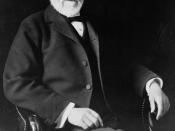Throughout history competition has created bitter tension between social classes. Competition has occurred in every social structure that has existed to this day. Social structure has been the determining factor of competition: in essence the poorer classes have always tried to compete with the wealthier classes to seize their wealth and power; the greater the economical gap between the two opposing classes the fiercer the competition between them. Two highly esteemed and different people, Karl Marx and Andrew Carnegie, developed their own ideologies to resolve and ease class tension, that is, whether changes should be imposed on the structure and role of social classes. Another writer, Sam Keen illustrates the effect of competition in the extreme. Within their opposing and controversial views, there lies the more efficient social-economic resolution: a modified version of Carnegie's argument, despite the fact that it has some imperfections. The answer is determined by the acknowledgment by the powerful and the wealthy of certain responsibilities to the poorer classes.
Each author feels that the competition within a capitalist society has definite effects on social structure but disagree as to what this effect is.
Competition exists in many forms and in our case it exists in the form of class struggles. The upper class, known as the bourgeois, possess wealth and power over the lower class, known as the proletariats, that consists of the working class in society. The battles between these two classes have ranged from verbal fighting to stages of bedlam and bloodshed. Financial stability allows the wealthy to fulfill their desires and needs by exploiting the working class to a great degree. In response, the working class engages in competing with the wealthy to overcome their control and establish itself as the ruling class. Unfortunately, relatively few people in the poor class ever...


